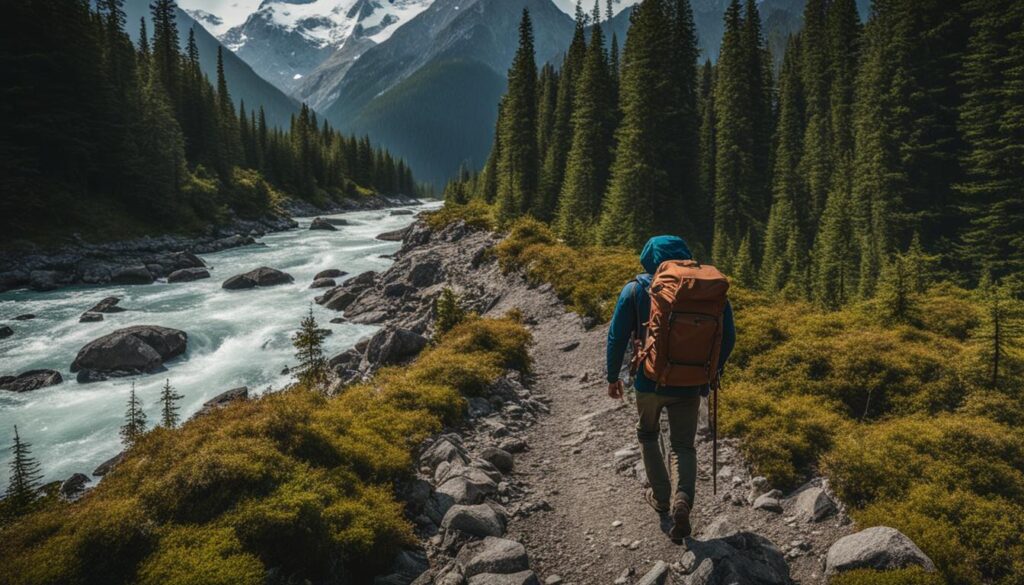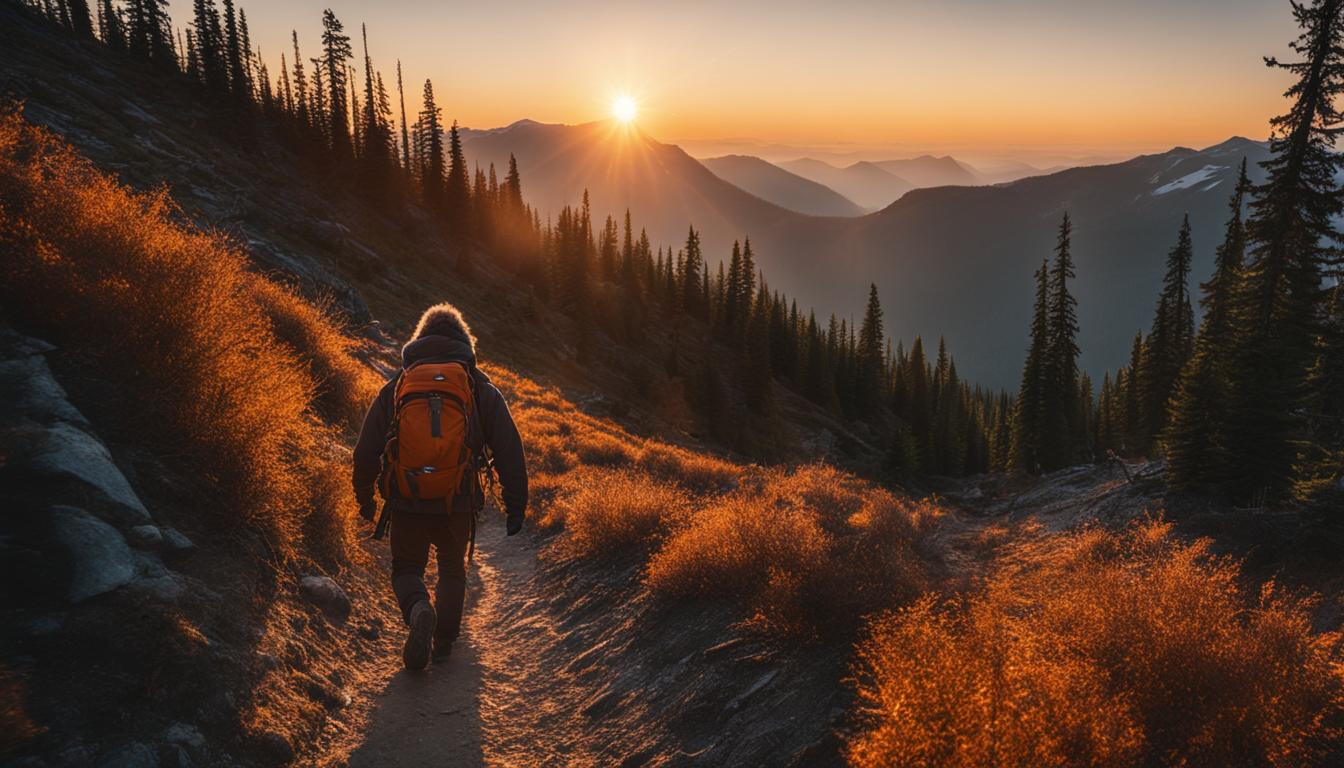Hey there! If you’re planning a backpacking adventure in bear country, it’s important to know how to handle a bear encounter. Bears in national parks can be unpredictable and potentially dangerous, so being prepared is key to staying safe. In this article, I’ll share some essential bear encounter tips and backpacking safety tips to ensure you have a memorable, yet secure, wilderness experience.
Key Takeaways:
- Stay calm and avoid surprising a bear by making noise and following viewing etiquette.
- If you encounter a bear, identify yourself as a human, stay calm, and avoid sudden movements.
- Hiking in groups and making yourself look large can deter bears.
- Never climb a tree or place yourself between a mother bear and her cubs.
- Know how to react in the event of a bear attack: play dead for brown/grizzly bears and fight back for black bears.
Now that you’re equipped with some essential bear encounter tips, let’s delve deeper into how to avoid bear encounters altogether. In the next section, I’ll share some valuable tips for hiking in bear country and camping safely. Stay tuned!
Tips for Avoiding Bear Encounters

When venturing into bear country, it’s essential to take precautions to minimize the chances of encountering these magnificent but potentially dangerous animals. Here are some bear safety tips to keep in mind while hiking or camping:
Know Your Surroundings
Before setting out, familiarize yourself with the area you’ll be exploring. Check for signs of recent bear activity, such as tracks or scat, and be aware of any known bear habitats. Understanding the type of bear species in the region and their behaviors can help you make informed decisions and react appropriately if you come across a bear.
Hike in Groups and Make Noise
Traveling in a group is one of the best ways to deter bears. Bears are generally wary of human presence and are more likely to avoid encounters when they hear and see multiple people. While hiking, regularly make noise by talking loudly or singing. This alerts bears to your presence, giving them a chance to move away before you get too close.
Proper Food Storage and Camp Setup
Keeping a clean camp is crucial to preventing bear encounters. Store food, trash, and any scented items securely in bear-resistant containers or hang them at least 10 feet off the ground and 4 feet away from the trunk of a tree. Cook and eat meals away from sleeping areas, and wash dishes immediately to eliminate food odors. Additionally, set up your camp away from dense cover and natural food sources to minimize the likelihood of bears being attracted to your site.
Carry Bear Spray
Bear spray is a valuable tool in bear country. It is a specially formulated pepper spray designed to deter aggressive bears. Before heading out, ensure you have a canister of bear spray readily accessible and know how to use it effectively. Familiarize yourself with the proper technique, aiming for the bear’s face if necessary, and practice deploying it quickly in a safe environment.
| Bear Safety Tips | Hiking in Bear Country | Camping in Bear Country |
|---|---|---|
| Know the area and bear species | Hike in groups and make noise | Proper food storage and camp setup |
| Carry bear spray and know how to use it | Stay on designated trails | Keep a clean camp and dispose of trash properly |
| Be aware of bear signs and behaviors | Keep dogs leashed and under control | Set up camp away from natural food sources |
| Avoid hiking during peak bear activity times | Learn and follow proper bear viewing etiquette | Use bear-resistant containers or hang food at a safe distance |
Conclusion
In conclusion, it is crucial to take precautions and stay safe in bear country to minimize the risk of a dangerous bear encounter. While such encounters are rare, being prepared and following safety guidelines is essential.
To begin with, always stay aware of your surroundings and make noise while hiking to avoid surprising bears. This will give them a chance to move away and prevent a potential encounter. Additionally, it is important to know how to identify different bear species and understand their behaviors so you can react appropriately if needed.
Hiking and camping in groups is another effective measure to deter bears and enhance safety. Bears are usually deterred by noise and the presence of multiple people. Therefore, whenever possible, make sure to hike with others rather than alone.
Finally, proper food and trash storage is key to preventing bear attraction. Ensure that your camp is clean and all food and trash are securely stored. This will help reduce the chances of a bear approaching your campsite in search of food.
By following these bear encounter precautions, you can greatly reduce the risk of a dangerous bear encounter and enjoy your outdoor adventures with peace of mind.
How Can Following Leave No Trace Principles Help when Encountering a Bear while Backpacking?
When encountering a bear while backpacking, following environmental backpacking practices like the Leave No Trace principles can help minimize negative interactions. Properly disposing of food and waste, minimizing noise, and respecting wildlife habitats can reduce the likelihood of dangerous encounters and promote coexistence with bears in their natural environment.
FAQ
What should I do if I encounter a bear while backpacking?
Stay calm and avoid surprising the bear. Identify yourself as a human by talking calmly and remaining still. If hiking with children, pick them up and slowly wave your arms above your head. Back away slowly and leave the area or take a detour if possible, but do not run.
How can I avoid bear encounters while hiking or camping?
Make noise while hiking to alert bears of your presence. Hike in a group to decrease the chances of surprising a bear and increase your safety. Avoid hiking at dawn, dusk, and at night when bears are most active. Keep dogs leashed and do not let them chase or interact with bears. Keep a clean camp and properly store food and trash to avoid attracting bears.
What should I do if a bear attacks me?
If it’s a brown/grizzly bear, play dead by lying on your stomach with your hands clasped behind your neck and legs spread apart. If it’s a black bear, fight back aggressively using any available means. Use bear pepper spray if you have it. Remember that each bear encounter is unique, so it’s important to react appropriately based on the situation.

